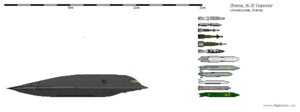B-20 Gaonmir: Difference between revisions
(Created page with "{|{{Infobox aircraft begin | name = B-20 Gaonmir | image = B-20 Gaonmir.png | caption = | alt = <!-- Alt text for main image --> }}{{Info...") |
No edit summary |
||
| Line 27: | Line 27: | ||
==Development== | ==Development== | ||
In the 1980s, the [[Greater Eastern Union Defense Forces]] intended to supersede the aging subsonic [[B-60 Azure Dragon]] bombers and some of the existing Mach 3-capable [[B-70 Iron Dragon]] bombers at service within the [[Greater Eastern Union Defense Forces#Greater Eastern Union Air Force|Greater Eastern Union Air Force]]. In response to such intent, the Department of Defense introduced the Next-Generation Strategic Strike Platform program and evaluated numerous design proposals across the {{wp|military-industrial complex}}, demanding at least 10,000 kilometers of ferry range without refueling and at least 20 metric tons of ordnance, as well as the capability to deploy {{wp|nuclear weapons}}. Among numerous designs that were considered at the time, two proposals - a subsonic, low-observable design developed by [[Jinmu Group|Jinmu Heavy Industries]], and a supersonic, reduced-observability design from the [[Hanshin Group|Hanshin]]-[[Paragon Group|Paragon]] consortium - emerged as final contenders. | |||
==Design== | ==Design== | ||
Revision as of 15:47, 1 January 2020
| B-20 Gaonmir | |
|---|---|

| |
| Role | Stealth strategic heavy bomber |
| National origin | Zhenia |
| Manufacturer | Jinmu Heavy Industries |
| First flight | Jine 4, 1992 |
| Introduction | May 17, 1997 |
| Status | In service |
| Primary user | Greater Eastern Union Air Force |
| Produced | 1996-Present |
| Number built | 96 (as of December 2019) |
| Unit cost |
$890 million (FY2019)
|
| Developed from | Next-Generation Strategic Strike Platform Program |
| Variants | B-20A B-20B B-20S |
The Jinmu Heavy Industries B-20 Gaonmir is a Zhenian strategic heavy bomber developed and built by Jinmu Heavy Industries, capable of being virtually undetected by enemy radars due to its stealth capabilities. As a stealth bomber, it is capable of carrying an array of close-range and standoff air-to-surface weapons, both conventional and nuclear, all while maintaining its stealthy configuration.
Development
In the 1980s, the Greater Eastern Union Defense Forces intended to supersede the aging subsonic B-60 Azure Dragon bombers and some of the existing Mach 3-capable B-70 Iron Dragon bombers at service within the Greater Eastern Union Air Force. In response to such intent, the Department of Defense introduced the Next-Generation Strategic Strike Platform program and evaluated numerous design proposals across the military-industrial complex, demanding at least 10,000 kilometers of ferry range without refueling and at least 20 metric tons of ordnance, as well as the capability to deploy nuclear weapons. Among numerous designs that were considered at the time, two proposals - a subsonic, low-observable design developed by Jinmu Heavy Industries, and a supersonic, reduced-observability design from the Hanshin-Paragon consortium - emerged as final contenders.
Design
Operational History
Variants
Operators
Specifications (B-20B)
General characteristics
- Crew: 2 (
- Capacity: 28 seated or 42 standing combat troops or 6,000 kg (13,000 lb) internally or 5,500 kg (12,100 lb) externally or 16 stretchers
- Length: 21.36 m (70.1 ft) ()
- Wingspan: 42.0 m (137.8 ft) ()
- Height: 3.39 m (11.1 ft) (not including landing gear) ()
- Wing area: 420.4 m2 (4,525 sq ft) ()
- Empty weight: 70,083 kg (154,507 lb) ()
- Loaded weight: 152,300 kg (335,800 lb) ()
- Max. takeoff weight: 176,000 kg (388,000 lb) ()
- Powerplant: 4 × Jinmu Motors AES-2000 non-afterburning turbofans, 18,000 lbf (80 kN) () each
Performance
- Maximum speed: 1,022 km/h (1,022 km/h (635 mph; 552 kn))
- Cruise speed: 908 km/h
- Range: 11,500 km (11,500 km (7,100 mi))
- Service ceiling: 16,000 m (52,000 ft) ()
Armament
- Guns: None.
- Hardpoints: 2 x internal weapons bays capable of holding at least 44,000 lb (20,000 kg).